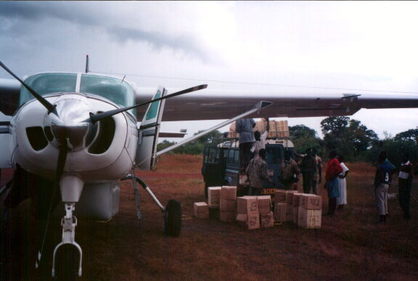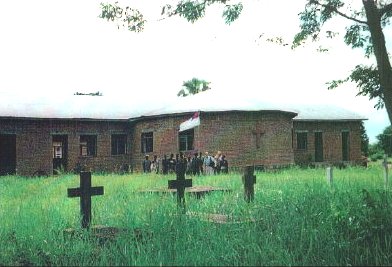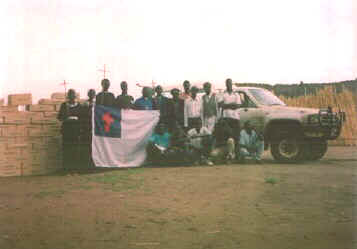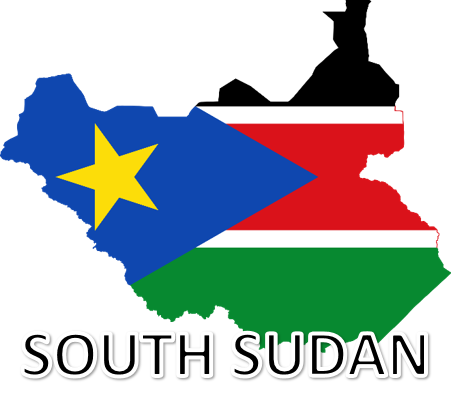 Amidst a spectacularly successful series of SPLA military offensives in Southern Sudan, the Director of Frontline Fellowship delivered a further shipment of Hymn and Prayer books, with medicines, to the persecuted churches. This was the 17th shipment successfully delivered by Frontline Fellowship into war torn Sudan. It brought to 26 000 the number of Bibles, Hymn and Prayer Books and other Christian books smuggled by Frontline Fellowship into the (officially Islamic) Sudan – in the first half of this year alone. This is what he reports: Christian Flags Fly Over Newly Liberated Towns During my latest mission trip to Sudan, in May, it was my privilege to visit some of the newly liberated areas along the Yei river battlefront. At every town I saw the distinctive (red cross on blue and white) Christian flags flying. There was a joyful atmosphere of thanksgiving to God for the remarkable series of victories the Christian soldiers had so recently experienced. Many soldiers related close calls and answered prayers during the recent battles.  Several SPLA officers, including commanders, commented that the turning point in the war was when the SPLA had accepted the appointment of Chaplains and decreed that all parades, and operations were to be started with Bible reading and prayer. “Our situation seemed hopeless two years ago . . . but as we have turned to God, He has begun to bless us with great victories,” declared one officer. “Each chaplain is worth many brigades of soldiers – they have done a great work in inspiring and strengthening our men,” said another. “These Bibles which you bring,” observed one commander “are very important weapons in our fight for Freedom. The Christian Bible is more powerful than the bombs of the Muslims!” There are now six full time chaplains and 36 chaplains assistants serving in the SPLA. To them Frontline Fellowship has delivered thousands of Bibles, Hymn books, prayer books and other Christian books. The Chaplains reported that hundreds of soldiers have come to faith in Christ in recent months. Lui and The Legacy of Dr. FraserOne of my chaplains services was held in the newly liberated town of Lui. Lui has been a very important and strategic missionary, medical and educational centre in Western Equatoria. It was the birthplace of Christianity in Moruland. In 1920, Dr Kenneth Fraser, of the Church Missionary Society, traveled up the Nile and felt led to Lui. He was a medical doctor, a teacher, a pastor and also a decorated soldier who had risen to Major General by the end of the First World War. General Fraser implemented what has proven to be one of the most successful missionary campaigns ever. His strategy was to fulfill the Great Commission by ministering to body, mind and spirit. He started by opening up a hospital, then a school, then a church. Soon he had established nurses training courses, teacher training programmes and pastoral training. He also translated the Gospels and Acts into Moru. As I stood before the simple white cross which marked the grave of Dr Fraser, I marvelled that what one man started could have accomplished so much. All around me was the evidence: a very large church, large schools, the hospital, the Teacher Training College and the Nurses College.  It was true that the Muslim government bombing and occupation had forced the people to flee and had damaged many of the buildings – but Jesus Christ is the Resurrection and the Life. Christianity is the religion of the empty tomb. Out of death comes life – abundant life. Today there are over 300 000 Moru Christians who belong to the Mundri Diocese – for which Kenneth Fraser laid the foundations. Many of the key Christian leaders in Moruland today received their education (and often medical treatment too) at Lui. The signs of the Arab occupation were everywhere – trenches, gun emplacements, pill boxes, mine fields, the debris of war, a newly painted mosque and many vandalised graves. There were a shocking number of broken crosses in the graveyard by the Lui church. (However, I noticed that none of the Arabic signs on the graves of Muslim troops who had been buried in Lui had been disturbed at all.) Rev.Jeffery pointed out the huge tree under which Dr Fraser had first begun Bible studies and church services. “Dr Fraser chose that tree to start the first Moru church because it was the same tree under which the Arab slave traders had bought and sold our people as slaves.” I looked at the tree with renewed appreciation of God's work of creation which made such a magnificent tree and God's work of redemption (re-creation) which has rescued us from the slavery of sin and death. We noticed that the memorial plaque which had been set up in front of the Redemption Tree had also been vandalised by the Arab invaders during their occupation. I preached the Word to the SPLA soldiers at Lui, and prayed with them that the great work begun at that town would continue, that once again the hospital, schools, colleges and church would be fully operating to the Glory of God and for the strengthening of His people in Moruland. Medical Clinic at Mundri is OperationalDespite a critical shortage of equipment and medicines, the field medics and nurses who completed the Frontline Fellowship Medical Workshop in March have managed to maintain an operational clinic close to the Yei river. I was most impressed with how much they had accomplished – especially with all the hundreds of patients they have had to care for during the offensives of the previous 3 months The clinic was clean, neat and efficiently run. There were over 40 patients in the 4 wards. Most were soldiers with gunshot wounds. A few had been injured by landmines. Some were civilians injured by mines or mortars. One man was in a very severe condition. He had multiple fractures and his tongue had almost been severed. The medics had effectively stitched his tongue back together again. (We transported this man back to the hospital at Maridi for further treatment). Some of the patients had various tropical diseases. One 9 year old boy was the only survivor of 3 who had been blown up by a GOS mortar bomb. His mother and brother had already died and he had wounds in each arm and leg and on his body. The chaplains had organised a special service at the Mundri clinic and well over 200 soldiers and civilians had gathered and were joyfully singing when I arrived back from Lui. After some hymns, prayers and greetings I presented the Medical Workshop certificates to those Medics present who had passed the written examination. They also received the first red cross/medical armbands and special medic packs with First Aid materials. In addition we delivered about 700 kg of antibiotics, pain killers, anti-inflammatory, fever reducing agents, bandages, gauze and other vital medical materials which had been donated by an American relief agency. The Mundri clinic urgently needs sheets (the patients are sleeping on reed mats on concrete floors – there are no beds or sheets and very few blankets available), eating utensils, mosquito netting for the windows, more paint (about half of the clinic has been painted) and of course many more medicines, bandages and gauze. The medics are also looking forward to further training courses and medical teams to come and assist them. The medical situation in Western Equatoria has become even more critical since the Red Cross suspended their flights. The Red Cross Hospital in Lokichoggio (Kenya) is the only fully equipped hospital (with X-ray machines for example) available for war wounded South Sudanese. The GOS and UN flight ban on most of Western Equatoria also means that there is no longer any opportunity to fly out patients. This makes it even more urgent that we provide the trained and motivated medics in Mundri with all the medicines they need to alleviate the suffering of the war wounded in Western Equatoria. There are not many places like the Medical Clinic in Mundri where so much can be achieved with so few resources. Literature Distribution One of the 17 shipments of Bibles delivered by Frontline Fellowship into Sudan.It was a joy to deliver 1 050 Arabic/English Hymn Books, 240 Avokayo Hymn Books, 2 050 Prayer Books in Moru, 40 Prayer Books in English and two boxes of other Christian books to the pastors of Western Equatoria. The recent dramatic advances by the SPLA are now also leading to other momentous upheavals as hundreds of thousands of displaced people and refugees plan to return to their, now liberated, home areas. Leadership Training The Diocese of Mundri is planning to restore the abandoned Bishop Gwynne College. This was the largest Bible College and Theological Seminary in Southern Sudan (named after the first CMS missionary to Sudan). As the college had been so close to the battlefront it had been abandoned for the last decade. At present there are only 3 Bible Colleges for all of Western Equatoria – and none of them are in Moruland. The rapid church growth and lack of adequate Bible training has led to a desperate shortage of trained pastors. Frontline Fellowship has been officially requested by the pastors of Mundri Diocese to help restore the Bishop Gwynne College. It would be a most strategically placed leadership training centre to lay firm foundations for evangelism, discipleship, pastoral ministry and Biblical Reformation. Defying Flight Bans On this mission trip, as on many others, the logistics were complicated by a flight ban by the GOS and UN over most of Equatoria (that part where we are working!) We were told by our hosts that when the radio message came through that a plane was going to land that day the local officials didn't believe it: “No planes come here any more. We're under a flight ban.” Rev. Jeffrey explained: “No, it's a Frontline Fellowship team coming.” To which they responded: “Oh! Frontline Fellowship,” they just nodded. Apparently we have a reputation for routinely breaking UN and GOS rules and flight bans. The drama that ensued over our return flight was another reminder of just how often we take the Lord's protection for granted on these (illegal) incursions into (the officially Islamic) Sudan. I was walking to the Zande Bible College for the last speaking engagement of my trip when I heard our aircraft – an hour early. I saw it coming in low and guessed that something was wrong when the pilot landed immediately without first circling the airstrip. I started running and collected my kit on the way. At the airstrip the pilot was very nervous and impatient to take off. He had been warned by radio that the authorities in Khartoum knew about this flight. The GOS had forwarded official warnings that the aircraft did not have permission to enter Sudan airspace and that it would be intercepted and shot down if it continued. Within seconds we were zooming out at maximum speed at tree top level – straight for the Zaire border. For several tense, prayer – filled minutes we scanned the skies for any sign of enemy aircraft. By God's grace we reached home safely. It had been another successful trip blessed by God: The Medical Clinic at Mundri was resupplied, the Field Medics had been equipped with First Aid packs, 3 500 more Prayer and Hymn books in 4 languages were delivered, Chaplaincy and Church services had been held, including in newly liberated areas, our friends in Southern Sudan had been further encouraged and important plans and preparations were discussed concerning future leadership training, educational and medical projects. This latest mission trip brings to 250 the number of church and chaplaincy services and other meetings addressed by Frontline Fellowship missionaries inside Sudan in the first half of this year and 26 000 the number of Bibles and other Christian books in 13 languages, delivered into 7 regions of Sudan by Frontline Fellowship – in the first half of this year. To those who made this trip possible and who prayed for it – May the Lord abundantly bless and reward you. Dr. Peter Hammond
0 Comments
Leave a Reply. |
More Articles
All
Archives
July 2021
|
"And Jesus came and spoke to them, saying, “All authority has been given to Me in heaven and on earth.
Go therefore and make disciples of all the nations, baptizing them in the name of the Father and of the Son and of the Holy Spirit,
teaching them to observe all things that I have commanded you; and lo, I am with you always, even to the end of the age.” Amen.” Matthew 28: 18-20
Go therefore and make disciples of all the nations, baptizing them in the name of the Father and of the Son and of the Holy Spirit,
teaching them to observe all things that I have commanded you; and lo, I am with you always, even to the end of the age.” Amen.” Matthew 28: 18-20
|
P.O.Box 74 Newlands 7725
Cape Town South Africa |
|

 RSS Feed
RSS Feed
